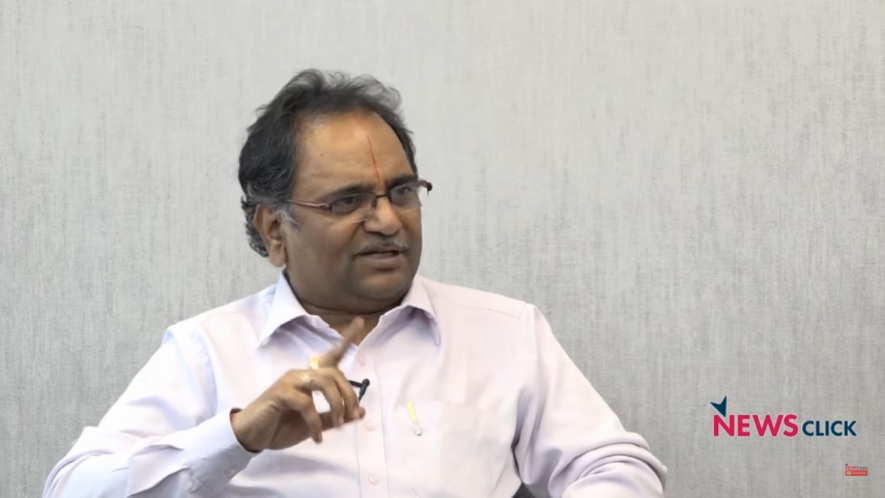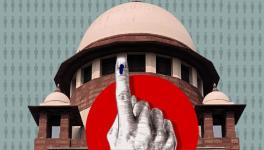Former Information Commissioner Alleges SLAPP Suits Against Commission

Image Caption: Former Central Information Commissioner M Sridhar Acharyulu
Recently retired Central Information Commissioner M Sridhar Acharyulu has written a letter to the President of India, that spoke about the government intimidating the Central Information Commission (CIC). The letter dated November 4, has alleged that the government – whether Union or state – has been repeatedly involved in using Strategic Litigation Against Public Participation (SLAPP) to delay disclosures as well as intimidate individual information commissioners.
According to his letter, there are around 1,700 writ petitions, most of them filed by government institutions, and the government impleading the Information Commission or Information Commissioners as respondents. On the one hand, these allegations are extremely serious when one has to consider the requirements of transparency and accountability in a democracy. On the other hand, as Acharyulu has pointed out, it results in a ridiculous situation of cases which are essentially ‘Union of India v. Union of India’.
Acharyulu’s letter mentioned three instances where such a situation arose; one concerned the prime minister’s university degrees, and the other two concerned the Reserve Bank of India (RBI) disclosing a list of wilful defaulters as well as foreign donations received by local non-governmental organisations (NGO). Acharyulu had dealt with both these matters during his time in the commission.
The Prime Minister’s Degrees
According to Acharyulu’s letter, he had passed orders as the Central Information Commissioner for the details of Prime Minister Narendra Modi’s degrees to be published. This was based on an appeal for the details, as Modi’s official website as well as his election affidavits claimed that he had obtained BA from Delhi University and MA from Gujarat University.
Acharyulu has claimed that he received three notices for that single order of disclosure; one as M Sridhar Acharyulu individually, second as M Sridhar Acharyulu as Information Commissioner, and third as the Central Information Commission. His letter mentioned that the Union Government challenged his order on the ground that disclosing the educational qualifications of a public servant would amount to a breach of privacy. He also stated that the Additional Solicitor General (ASG) of India flew all the way from Delhi to Ahmedabad to challenge his order. According to his letter, initially, the Gujarat University had complied with his order only to later challenge it through a writ petition. The Gujarat High Court has also granted a stay on the order.
The Reserve Bank of India orders
On November 16, based on a 2015 decision of the Supreme Court in Reserve Bank of India v. Jayantilal N Mistry, Acharyulu passed an order for the RBI to disclose the names of wilful defaulters on loans worth Rs. 50 crore and above. The Supreme Court had clubbed together 11 appeals to dispose the matter. The RBI has chosen to challenge this order, and has made the CIC the first respondent. Another matter concerns a CIC order wherein the RBI has to disclose the details of local NGOs receiving foreign donations. According to Acharyulu, the RBI has challenged this order in the Bombay High Court, and made the CIC the first respondent.
The Central Information Commission and the Right to Information Act
Acharyulu’s letter asks a most pertinent question; can an adjudicatory authority be made a party to challenges against its orders? Though not specifically mentioned in the Right to Information Act, the Central and State Information Commissions function as quasi-judicial bodies. Their administrative duties relate to ensuring the compliance of government bodies with voluntary disclosure. Section 21 states: “No suit, prosecution or other legal proceeding shall lie against any person for anything which is in good faith done or intended to be done under this Act or any rule made thereunder.” Under Section 23, the courts have no jurisdiction with regard to any of the proceedings of the commission, except by way of appeal. Section 18(3) of the Act vests the Information Commissions with the powers of a civil Court under the Code of Civil Procedure in specific matters;
- summoning and enforcing the attendance of persons and compel them to give oral or written evidence on oath and to produce the documents or things;
- requiring the discovery and inspection of documents;
- receiving evidence on affidavit;
- requisitioning any public record or copies thereof from any Court or office;
- issuing summons for examination of witnesses or documents; and
- any other matter which may be prescribed.
The CIC appears to have adequate protection under the Act. The CIC is protected for actions taken in good faith, and has sufficient legal autonomy with regard to its proceedings. Yet Acharyulu’s letter states that there are around 1,700 writ petitions against the CIC and Information Commissioners. If despite the law being apparently clear on the matter, the CIC is still being dragged to the Court, it would lead more credence to the former Information Commissioner’s allegation of SLAPP suits.
Get the latest reports & analysis with people's perspective on Protests, movements & deep analytical videos, discussions of the current affairs in your Telegram app. Subscribe to NewsClick's Telegram channel & get Real-Time updates on stories, as they get published on our website.
























